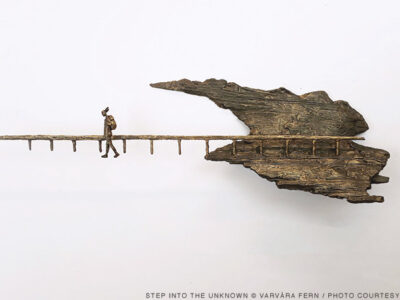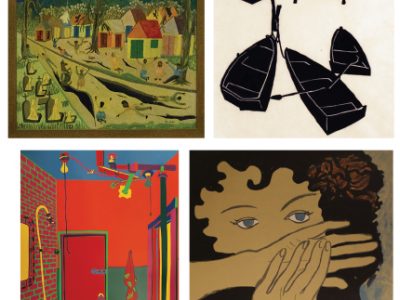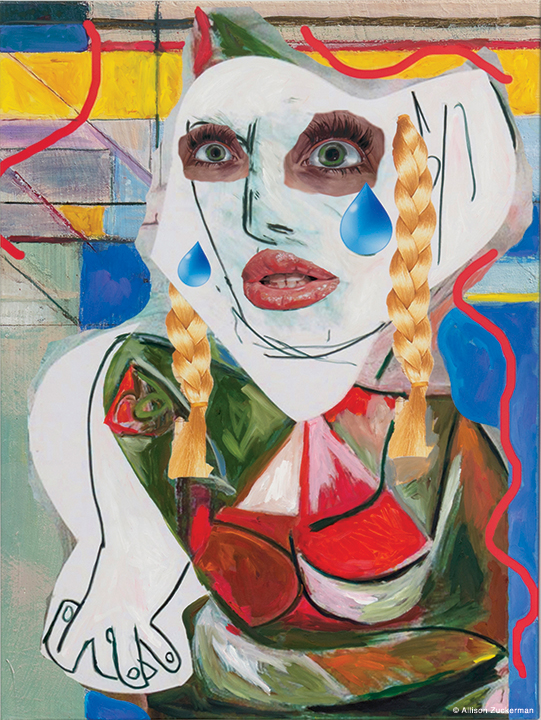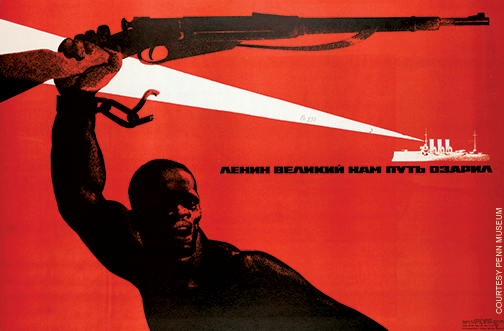
Tukufu Zuberi, the Lasry Professor of Race Relations, has been a very busy man of late. In addition to his duties as professor and chair of the Department of Sociology, this scholar and storyteller hosts the PBS series History Detectives, now in its 11th season, and wrote, produced, and directed a documentary film, African Independence, that was released earlier this year. Over the summer, he made a foray into the museum world, with two concurrent exhibits. Black Bodies in Propaganda, culled from his own collection of war posters, runs at the Penn Museum through March 2, 2014. Tides of Freedom: African Presence on the Delaware River is on view at the Independence Seaport Museum through 2015.
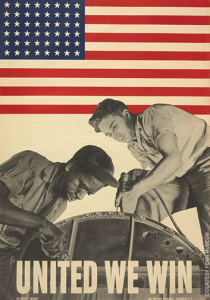 Museum curating is something new for you. How did it come about?
Museum curating is something new for you. How did it come about?
It’s a clear progression of my work. I have already moved into a very public space—with the television show on for so long—and the extension of that work to this more contemplative format allows me to foster a broader and more in-depth conversation about something that I think is important.
It was the right moment for me to do both exhibits. At the Penn Museum, it’s a result of my relationship with them and the continued conversations we’ve had about how to increase its examination of Africa and the African diaspora. The Seaport Museum asked me to consider putting together an exhibit on the Delaware, and we talked and came up with this idea of using the African presence on the river, using four watershed historical events: enslavement, emancipation, Jim Crow, and civil rights.
The posters come from your own collection, but what was your role in the latter exhibit?
Sometimes I said, ‘We need x, let’s find it.’ Other times, I went into the archives of the [Seaport] museum to look at what they had. We found all kinds of stuff—I think even they were surprised. For example, there’s an 18th-century waste book in which accounting records were kept. When you tease the story out of these rather nondescript notations, you get a history of the Middle Passage, and that transaction from being a captive to becoming a slave where an un-naming process occurs along the way. So, somebody began with the name of, say, Akwah, and it’s dropped and he’s recorded as “one negro man.” This un-naming was part of the dehumanizing.
The section on emancipation is particularly compelling. Everyone’s story is a little different and you’ve found some great Philadelphia connections.
As soon as the first Africans arrived, they wanted freedom. So the initial moves to gain it was through self-emancipation, and that occurred in different ways: buying freedom, escaping, or stepping off of a ship into free territory like Philadelphia. The abolitionist movement was really strong here, too. Just finding those connections of someone like Frederick Douglass was a learning experience for me. Then there’s James Forten, who was a legend on the Delaware because he ran a very successful sail-making business that employed both whites and blacks.
Let’s talk about the posters. How did you start collecting them?
I was doing an investigation for the TV show and in the process I went into some guy’s shop in Harlem where I came across my first poster. It was from 1918 and called “Our Colored Heroes.” It was made to advertise a film that was produced to encourage African Americans to support the World War I efforts. So you have a lot of things depicted here that represent the successes and the heroism of the African-American soldiers. No one can locate the film, and the shopkeeper didn’t know much about the poster either. But it really intrigued me, because there’s white bodies littered on the ground, being shot by African Americans. I mean, wow, that is powerful!
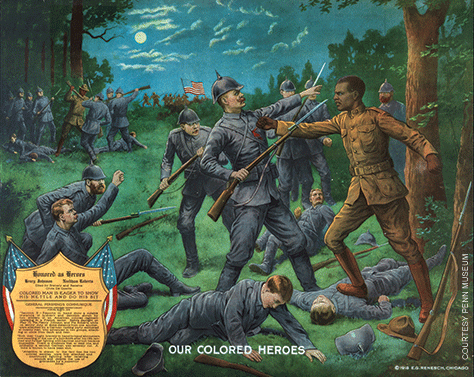
So you found the poster and decided to start collecting?
Yes, this poster was pretty rare, and I had no idea how big of a genre this was. They’re all about black soldiers in war during times when they were not free. Altogether I have 45, 33 of which are in the exhibit.
Tell me about another favorite.
Well, look at this one, “African-American Soldier With $2 Venus.” This is great. It’s an Italian poster that shows an African-American soldier selling a priceless object for very little, further confirming that he is not civilized. It’s incredibly racist. It’s saying, ‘Be careful, these soldiers are coming and they don’t understand our culture.’ And this poster is very well known. It’s become iconic—there have been several magazine covers that people have likened to this poster. There’s one where LeBron James is juxtaposed with a very attractive white model in the same exact way. (Zuberi locates it on the web.)Look at the position—ho! ho! And she’s wearing a white dress! It’s not like whoever did this was unaware of what he was doing.
Sounds like you have a knack for making these kinds of curatorial links. Would you like to do more?
It has been just mind-boggling. I am trying to be loyal to my academic understanding of the world, so I present these exhibitions because they are an excellent way to better understand the social relations between people and the social facts that are the contexts for these relationships. And, at the same time, they give me a space to express myself and offer me access to my community and give people a tactile opportunity to think with me about something important.
So, what’s your favorite medium?
I am a senior professor. I am the holder of an endowed chair. Now, what does this mean? I work at the most important institution in the democratic society. We are that space where we are free to express ourselves and to provide the best of knowledge and to present it in a way that will benefit humanity and our world.
Nothing beats teaching?
Ha, ha! That’s my vocation in life. There is no other space that does this like the university. Nobody tells me what to say. People can argue about what I say, they can tell me I’m wrong. But I have the freedom to risk it all, and that is the beauty of what I do.
There’s that word again: freedom.
There you go. I believe in freedom, yes I do.
—JoAnn Greco


